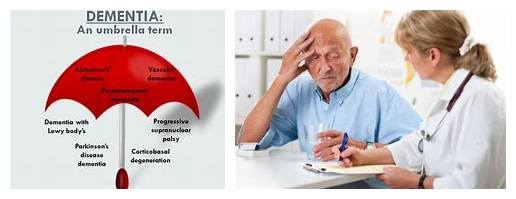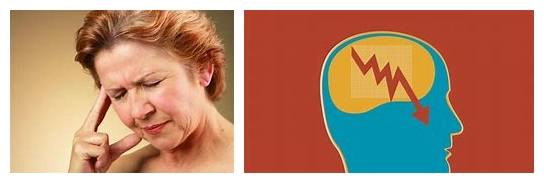What is normal forgetfulness and when is it concerning? This is a useful tutorial that describes normal changes with aging and early signs of dementia as wellas provides useful tips for keeping your brain healthy.
On this page:
What is normal forgetfulness? | When is forgetfulness concerning? | What is dementia? | Causes | Diagnosis | Prevention
What is Normal Forgetfulness?

Many of us may panic at signs of forgetfulness, especially as we grow older. It can be extremely reassuring to know what’s normal yet very helpful to be aware of the signs of early dementia.
Certainly a mild degree of short-term memory loss does normally occur in the 60’s and 70’s. Household items are more often misplaced, familiar names and vocabulary words can become more difficult to call to mind. It’s harder to learn something new, such as using a computer, especially if there’s been little previous exposure to computers. Simple stress, fatigue, or illness can have a dramatic, temporary adverse affect on the intellectual functioning of an aging person. Although these symptoms can be alarming, they can certainly be a normal part of aging. However, there are distinctive symptoms often associated with dementia that are cause for concern and should be brought to the attention of a primary health care provider.
When is Forgetfulness Concerning?
Short-term memory loss or forgetfulness related to events, activities, or conversations that happened within the last few hours is one of the earliest symptoms of dementia. Asking the same question over and over again is a common symptom of early dementia experienced by family members. Under most circumstances, if someone can’t remember what was told to them 10 minutes ago, it’s usually cause for concern. A one-time occurrence certainly may only be due to the fact that the person was not paying attention or was not feeling well, but recurrent episodes of repeated, similar questions would signal a significant disorder.
Forgetting to do routine chores which have been done regularly in the past is a common occurrence in people with early dementia.
Increasing difficulty performing familiar tasks that require a somewhat higher level of thinking such as balancing a checkbook, paying the bills, cooking a simple meal, or driving to a familiar place, are symptoms of a significant disorder. Certainly as we age, it’s harder to learn something new and unfamiliar neighborhoods and busy streets may be more daunting than in the past, but familiar cognitive tasks should continue to be manageable, as long as there are no physical limitations or visual impairments. It’s normal to forget where you parked your car–but it’s not normal to forget how to drive your car. Misplacing your car keys can be normal; looking at the key and being unsure what to do with it, is not normal.
Familiar names and vocabulary words can be more difficult to call to mind as we get older, but a person with Alzheimer’s Disease has progressively increasing difficulty with word finding as well as verbal expression of common words. Everyone has trouble finding the right word sometimes, but a person with Alzheimer’s often forgets simple words or substitutes unusual words, making his or her speech or writing hard to understand. For example, if a person with Alzheimer’s is unable to find his or her toothbrush, the individual may ask for “that thing for my mouth.” As the disease progresses, they will not only forget names, but they may forget ever having known familiar people. It’s normal to forget a person’s name and then remember it later. It’s not normal to forget ever having known a familiar person.
Misplacing things can be a normal, insignificant problem for some people, but a person with Alzheimer’s has increasing difficulty with misplacing important items and eventually starts putting things in unusual places, like an iron in the freezer or a wristwatch in the sugar bowl.
Disorientation to time. It is normal to be unsure of the day of the week, or specific date of the month, especially when a person is retired and their routine doesn’t really change on the weekends. It is not normal to think it’s January when it’s July, or to be confused about what year it is.
Disorientation to place. It certainly can be normal to get lost driving somewhere unfamiliar, but getting lost in your own familiar neighborhood is not normal. Another common example would be thinking they are at a friend’s home when they’re actually in the hospital.
Increasingly poor judgment such as dressing without regard for the weather, wearing several shirts on a warm day or very little clothing in cold weather can be signs of a developing problem. Poor judgment about money is a common mishap made by someone living alone suffering from early dementia. The elderly are common targets of telemarketers who convince them to give away large sums of money or make unnecessary home repairs.
Personality changes, in conjunction with the above, are certainly signs of a significant disorder. The following are typical personality changes that can occur in Alzheimer’s:
- becoming silent, apathetic and withdrawn from social situations that they once enjoyed.
- increasingly irrelevant conversation
- acting more irritable or suspicious than usual with rapid mood swings
- believing things that are not real (delusions). (In later stages auditory or visual hallucinations may occur)
- dressing differently
- loss of initiative: loss of interest in hobbies, reading, attending church or social activities that used to be enjoyable.
What is Dementia?

Dementia is not a specific disease but is a description of a collection of symptoms that occurs when the parts of the brain are affected by injury or disease. Dementia is a general term that describes significant impairment of mental functions, such as thinking, memory, reasoning, speaking or moving. These symptoms are severe enough to interfere with a person’s daily life and relationships.
While memory loss is a common symptom of dementia, memory loss by itself does not mean that a person has dementia. Doctors diagnose dementia only if two or more brain functions – such as memory and language skills — are significantly impaired. Although it is common in very elderly individuals, dementia is not a normal part of the aging process.
The most common cause of dementia is Alzheimer’s disease, which is thought to be responsible for at least half of all cases of dementia. However, there are as many as 50 other known causes of dementia. Although many diseases that cause dementia are not curable, some forms may improve greatly when the underlying cause is treated. For instance, if vitamin or hormone deficiencies are causing mental decline, the symptoms may resolve once the problem has been corrected. Thus, it’s essential to seek medical advice when dementia-like symptoms occur in order to avoid potentially reversible conditions, but also to intervene early in all forms of mental decline. The frequency of reversible causes of dementia is thought to be around 20%.
Causes of Mental Decline
- Alzheimer’s disease is the most common form of dementia, but dementia can also occur as a result of:
- Stroke, or multi-infarct dementia, is the second most common cause of mental decline and can result in a sudden onset of dementia-like impairment, whereas Alzheimer’s symptoms worsen slowly and gradually over time. After a stroke, the patient is likely to show signs of improvement or remain stable for long periods of time, then quickly develop new symptoms if more strokes occur. The location in the brain where the small strokes occur determines the resultant symptoms and the seriousness of the problem.
- Infections of the central nervous system such as meningitis, HIV, and Creutzfeldt-Jakob disease.
- Traumatic brain injury from accidents involving severe head injury
- Multiple sclerosis, certain forms
- Parkinson’s Disease
- Pick’s Disease, Huntington’s Disease
- Liver failure, kidney failure, Diabetes
- Dementia can also be due to reversible (treatable) causes such as: medication reactions, thyroid disease, depression, infections, certain vitamin deficiencies, fluid and electrolyte disorders, tumors and blood clots in the brain and other metabolic diseases. The frequency of “treatable” causes of dementia is believed to be about 20%.
Diagnosis of Dementia
To diagnose dementia, a primary health care provider will first ask questions and perform a physical examination. During this visit it’s important to convey any information related to the above symptoms–whether these symptoms came on slowly or suddenly is relevant in the diagnosis. For example, a dementia due to Alzheimer’s will develop slowly, whereas the dementia that can occur from a stroke will come on suddenly.
A test commonly used by physicians to help screen for significant memory problems is called the MiniMental State Examination (MMSE). A similar test can also be performed by a non-medical family member. It is a simple questionnaire that will give the family member an idea if there is reason to seek medical advice.
Further testing by the doctor usually includes blood and urine tests to check overall health and to rule out other conditions that may be causing the symptoms. A CT or MRI scan of the brain might be ordered as well. The diagnosis of Alzheimer’s is made based on the symptoms, and by ruling out other conditions that mimic the disease. There is no specific test that can diagnose Alzheimer’s with absolute certainty. In fact, an experienced medical team can diagnose Alzheimer’s with only about 90 percent accuracy. Unfortunately, only an autopsy can reveal the characteristic abnormal protein deposits within the brain after the patient dies.
Prevention of Mental Decline–Keep your Brain Healthy

As we get older, it’s even more critical that we work hard to stay healthy so we can enjoy our lives to the fullest. The following are sound preventive measures that will optimize our mental function:
- Stay active physically — Follow an exercise program that builds up to 30 minutes of moderate-intensity exercise a day on most days each week.
- Stay active mentally –Many clinical studies have found that people who were free of Alzheimer’s disease in later life were more likely to have engaged in mentally stimulating leisure activities when they were younger. These activities included playing chess, reading books, playing a musical instrument, or learning a foreign language.
- Good nutrition
- Include good fats in your diet and limit saturated fat and trans fat in the diet
- Eat 4-5 cups of fruits and vegetables per day
- Don’t smoke
- If you drink alcohol, do so only in moderation (no more than 1 drink/day for women, 2 drinks/day for men)
- Get enough sleep
- Avoid exposure to viruses–Stress, fatigue, and illness significantly impacts our intellectual functioning as we get older.
- Keep medical conditions (HTN, Diabetes, etc.) under control
- Minimize stress
- Plan ahed, be organized and consistent. Be organized in your home, putting items where they belong, consistently in the same place so you can find them later.
- Have a system to remember names, dates, events, appts.:
- Write all appointments down on a calendar–preferably use only one calendar. Write everything down, in a place where you’ll see it. When going to the doctor, make a list of your questions. Write down the doctor’s answers and keep it with all other medical records and lab results.
- Practice names ahead of time, before going to a party or family get together.
- If you want to remember something, say it out loud, repeating it several times. For example, someone who has trouble remembering if they locked the door should say out loud “I’ve locked the door” once they’ve completed that task. This commits a name or thought to memory much better than merely thinking it.
- Remember special events in your life with pictures placed around your house with dates in plain view somewhere on the picture. A photo album that has at least one picture of every important day in your life is a helpful visual aid of past accomplishments and life events. Computer screen savers that scroll through a person’s life, with the dates on each picture, are an enjoyable memory tool in the home.
- Attention does decrease with age. As we get older, we have more of a “one-track mind”. Decreased attention is sometimes the culprit when someone can’t remember something that was said to them, or can’t recall where they put something. If you’re having trouble misplacing items, such as keys, for instance. Ask yourself, “Am I paying attention when I put my keys away?” For some people, simple efforts to concentrate and pay closer attention can help what seems to be a memory problem. Another technique for someone who loses their keys, would be to consistently put them in the same place.
References
(1) Dementia from the National Institute of Neurological Disorders and Stroke
(2) NIH Senior Health from the National Institute of Health, a comprehensive, easy to navigate website.
(3) Alzheimer’s Disease at Medline Plus, A service of the Nat’l Library of Medicine and the Nat’l Institute of Health
(4) Alzheimer’s Resource Room from the Administration on Aging, U.S. Dept of Health & Human Services

